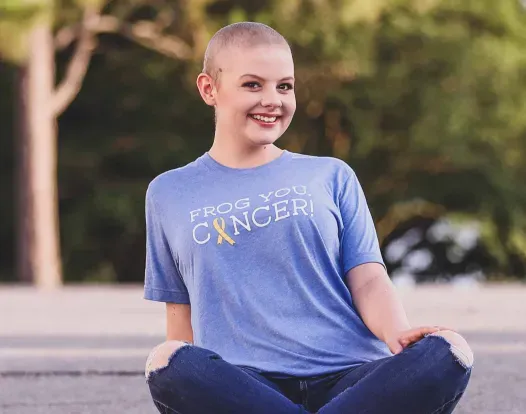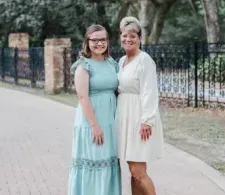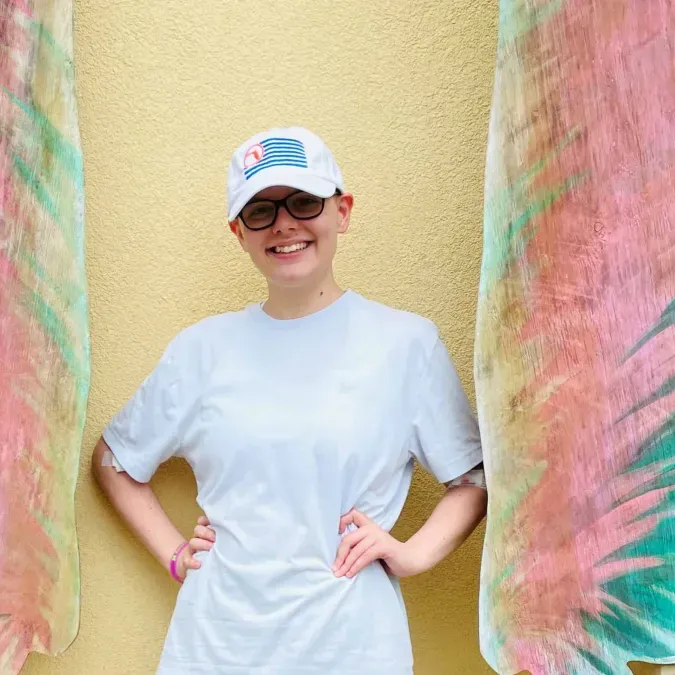A Rare Blood Cancer, a Future Put on Hold, and a Remarkable Journey to Remission



This was supposed to be Auburn Frymire’s year.
It was January 2021, halfway through her senior year of high school in the Florida panhandle. Almost nine months after COVID-19 had up-ended classrooms around the nation, everything was looking up: Prom was around the corner, then graduation, then college. She had a new part-time job, and online school had spared her from the bullying that had made her first years of high school so difficult. She was even thinking of buying a car.
“I just wanted to make life better for myself,” Auburn says. But then, she continues, everything came apart.
A few months earlier, she’d developed a series of nagging symptoms, including a strange rash and a persistent cough. But, she says, her various ailments didn’t seem related. And so, she saw a dermatologist for the rash, another doctor for the cough, and simultaneously spent far too much time in and out of urgent care clinics.
Then one Thursday night in late January, when Auburn began experiencing agonizing chest pain, her mother, Sherry Frymire, rushed her to the emergency room. When a CT scan revealed a 13-centimeter mass in the center of her chest—right between her lungs and above her heart—doctors ordered more tests and scans.
By Saturday morning, doctors had diagnosed Auburn with Hodgkin lymphoma. “And then,” Auburn says, “our whole world shattered in just five minutes.”
Stunned on Saturday, moving on Monday
Sometimes referred to as Hodgkin disease, Hodgkin lymphoma is a rare blood cancer that develops in the lymphatic system—the group of organs and tissues that help protect the body from infection and disease. Though it can occur at any age, Hodgkin lymphoma is most common in patients between the ages of 15 and 40.
Auburn had just turned 18.
As they drove home from the hospital—36 hours after they’d first arrived—Auburn and her mother sat silent, still stunned by a diagnosis they couldn’t wrap their minds around.
“It was like our lives just flashed before our eyes,” recalls Sherry Frymire, Auburn’s mom. “It was like a whirlwind. Did this really happen? Am I dreaming? Is she dreaming?”
For the rest of the weekend, they agreed to pretend nothing had happened and to simply enjoy their Saturday and Sunday. “And then, come Monday morning,” Sherry says, “it was time to get the ball rolling.”
That Monday, Auburn and her mother got in their car and set out on the long drive to the O’Neal Comprehensive Cancer Center at UAB, the hospital in downtown Birmingham, Alabama, where she was referred for further assessment. From there, she was referred to another hospital in Gainesville, Florida—closer to home, but still several hours away—while her care team worked to identify the best course of treatment.
The days that followed were filled by intense pain, long drives, and ever-evolving treatment plans. All of Auburn’s future plans—prom, graduation, college—would have to wait. Meanwhile, her mom braced herself for the months ahead, determined to be the pillar of strength and calm that her daughter so desperately needed.
“I just knew I had to be strong,” Sherry remembers. “She needed me at my best, not my worst. So, we just geared up and said, ‘OK, we’re going to do this, no matter what it takes.”
Then things got worse.
“The most traumatic thing I’ve ever experienced.”
One morning—not long after she began chemotherapy—Auburn woke up with intense stomach pain and nausea.
With her daughter growing sicker by the minute, Sherry insisted on going to the hospital. But before they could get there, Auburn’s pain grew so excruciating that Sherry pulled over and called 911. An ambulance arrived and rushed her to a nearby community hospital.
When her condition continued to deteriorate, doctors there decided to transfer her by helicopter to a larger, better-equipped hospital in Pensacola. But bad weather forced them to transport her by ambulance instead.
She spent the next 17 days in the hospital, the first six days in the ICU, where they realized that a bad reaction to her first course chemotherapy had led to a dangerous infection in her colon. Chemo had to be put on hold while she recovered.
“If it could go wrong, it did go wrong,” Auburn says. “It was probably the most traumatic thing I’ve ever experienced in my life.”
Fortunately, her situation was about to take a significant turn for the better.
Choosing between treatment toxicity and the risk of relapse
Once Auburn recovered from her infection and resumed treatment, her care team opted for a different, less toxic form of chemotherapy. Meanwhile, Auburn was faced with another challenge: the prospect of undergoing radiation therapy.
Given her initial experience with chemo and the fact that she had to change course mid-treatment, Auburn and her care team were understandably concerned doing all they could to avoid a relapse. At the same time, they also wanted to make sure she had time to fully recover—both medically and mentally—before beginning radiation.
“My doctor gave me the option of choosing not to do radiation,” Auburn says. “But he highly recommended it, so I did.”
Her decision made and a referral in hand, Auburn scheduled a call with radiation oncologist Raymond Mailhot, MD, based at the University of Florida Health Proton Therapy Institute in Jacksonville, Florida.
Dr. Mailhot is a Conquer Cancer grant recipient whose research focuses on improving radiation outcomes for pediatric patients with cancer—including by reducing treatment toxicity. His Conquer Cancer-funded research, he says, helped him learn to more effectively evaluate the unique contexts and needs of each individual patient to determine the safest but least traumatic course of care.
“As the radiation oncologist, I’m last in the treatment sequence,” Dr. Mailhot explains. “Because the original chemotherapy was too toxic for her and made her too sick, we had to figure out something safer, as well as how that would affect my recommendations for her treatment.”
Hodgkin lymphoma, Dr. Mailhot says, has always had a relatively favorable prognosis compared to other blood cancers. Because of that, he continues, “It’s often a question of how we can safely de-escalate care? How do we identify which patients will respond well to treatment and which ones won’t, so that we can possibly adjust their treatment to reduce side effects?”
Auburn spent 30 days in Jacksonville undergoing radiation with Dr. Mailhot. For their part, Auburn and Sherry mark Dr. Mailhot’s entrance to her care as a turning point. “From that point forward, everything’s been going pretty smoothly,” Auburn says. “He took such good care of me.”
Good days, bad days, and more days to come
The news came on October 7, 2021, 10 months after that first visit to the emergency room: Auburn’s cancer was in remission.
Now, three years cancer-free, Auburn is determined to pick up where she left off when cancer forced her to put her future on pause. She’s 21, and she has a boyfriend she loves. She’s living in Panama City and working at a beach-side resort on Florida’s Gulf Coast. She’s even considering a career in healthcare, maybe as an ultrasound technician.
“Some days are better than others,” she says. “But that’s normal.”
There are hard moments. She struggles with PTSD and has difficulty setting foot inside a hospital. The sight of her surgical scars can trigger bad moments, and she’ll find herself struggling to cope. And, she says, there’s the survivor’s guilt that inevitably creeps in, knowing that she’s still here while other patients are not.
But every day that she gets to work outside in the sunshine or visit the beach or go to the pool is one more chance to live life to the best of her ability. Some of the best days, she says, involve doing nothing more than enjoying the air conditioning.
"I’m content,” she says. “It changed my life in both a negative and a positive way. I look at life differently than I used to. And I don’t take a single thing for granted.”
Supporting Research for the Future
Now until September 30, 2024, you can make double the impact for patients like Auburn! Gifts will be matched dollar-for-dollar, up to $20,000, for pediatric cancer research. Make your gift here.
